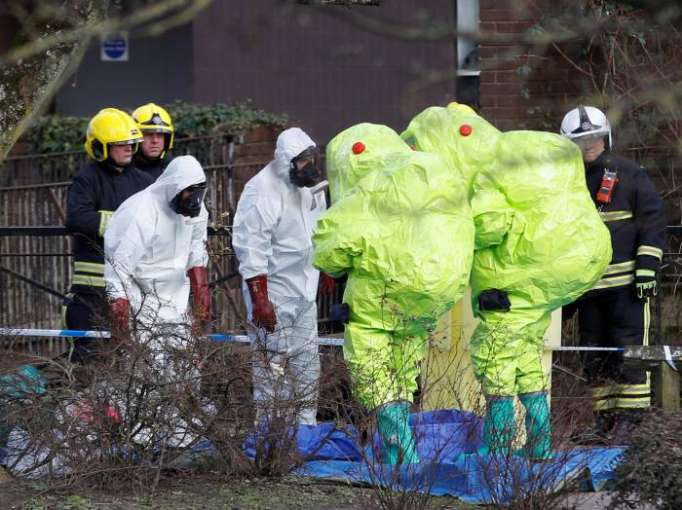The admission comes the day before Moscow convenes an emergency meeting of the Organisation for the Prohibition of Chemical Weapons (OPCW) in The Hague in which it is expected to demand access to samples from the Salisbury poisoning for analysis by Russian scientists.
Russia’s embassy in London responded that Porton Down’s assessment “proves that all political declarations on the Russian origin of the crime are nothing but assumptions not stemming from objective facts or the course of the investigation”.
The development also comes after Russia’s foreign minister, Sergei Lavrov, suggested that British intelligence services carried out the attempted assassination of the former MI6 agent Sergei Skripal and his daughter Yulia and claimed that it had proved “beneficial” in distracting attention from Theresa May’s government having to make major concessions to the European Union on Brexit.
The OPCW is due to present its own conclusions on the nerve agent in the near future. It remains to be seen whether it will be able to provide definite proof that the novichok came from a Russian government facility or echo the Porton Down position.
Gary Aitkenhead, the chief executive of the Defence Science and Technology Laboratory (DSTL) at Porton Down, Wiltshire, told Sky News that the substance required “extremely sophisticated methods to create something only in the capabilities of a state actor. We were able to identify it as novichok, to identify that it was military-grade nerve agent.”
Mr Aitkenhead went on to say: “We have not identified the precise source, but we have provided the scientific info to the government who have then used a number of other sources,” some of them intelligence-based.
The head of Porton Down denied claims that his research centre had been connected in any way with a “false flag” operation or that the novichok used may have come from it. “There is no way that anything like that would ever have come from us or leave the walls of our facilities,” he said. “We deal with a number of very toxic substances as part of the work that we do.”
There has been no immediate reaction from the Kremlin on the Porton Down assessment, but there is little doubt that it will be used to support its claims that UK has no real evidence to back up the accusation of Russian state culpability in the attack.
Speaking of the OPCW emergency meeting, Yury Filatov, the Russian ambassador to Ireland, said: “We hope to discuss the whole matter and call on Britain to provide every possible element of element of evidence they might have on their hands. Russia is interested in establishing the whole truth of the matter and we hope certainly that this meeting will help to return to at least the realm of normality within the realm of international law and decency in international matters.”
A British government spokesperson insisted that the Porton Down assessment was “only part of the intelligence picture”. He continued: “As the Prime Minister has set out in a number of statements to the Commons since 12 March, this includes our knowledge that within the past decade, Russia has investigated ways of delivering nerve agents probably for assassination and as part of this programme has produced and stockpiled small quantities of novichoks, Russia’s record of conducting state-sponsored assassinations and our assessment that Russia views former intelligence officers as targets.
“It is our assessment that Russia was responsible for this brazen and reckless act and, as the international community agrees, there is no other plausible explanation.”
Twenty-nine countries and Nato carried out a mass expulsion of almost 150 Russians working under diplomatic credentials after Britain provided information that pointed to Vladimir Putin’s government as responsible for Salisbury attack.
“Unprecedented levels of intelligence” had been divulged to convince these states, said senior government officials, including conclusions of Porton Down and an explanation of how this was obtained.
However, in addition, highly classified information, which is normally shared only between the “Five Eyes” countries – the UK, the US, Australia, New Zealand and Canada – was supplied to close allies with the national security adviser, Sir Mark Sedwill, taking it to the European Union and the North Atlantic Council. Other countries were given differing levels of intelligence.
The development came as a former Russian general warned the response to the Salisbury the attack could trigger “the last war in the history of mankind”.
Speaking on BBC Radio 4’s Today programme, Evgeny Buzhinsky said the West was “cornering Russia and to corner Russia is a very dangerous thing”.
He added: “If the situation develops in the way it is now, it will end up in a very bad outcome.”
More about: Salisbury nerveagent

























-1731503623.jpg&h=190&w=280&zc=1&q=100)






















